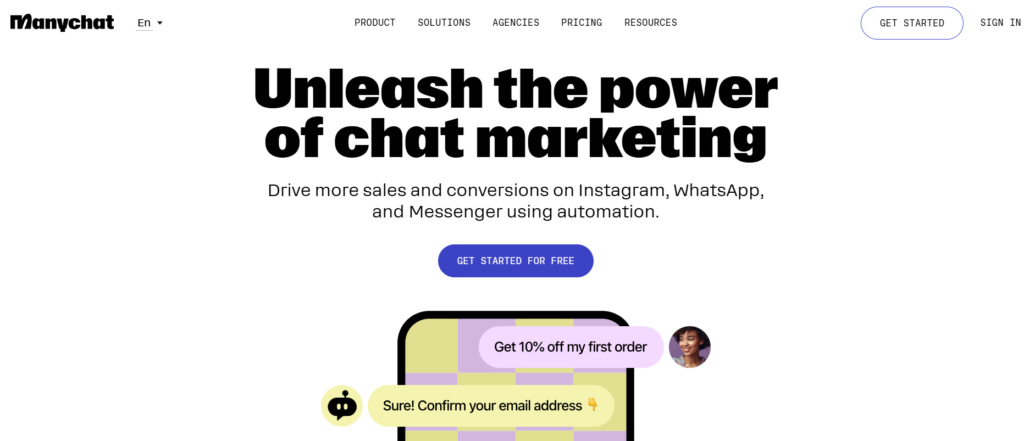Introduction
Marketing strategies have evolved significantly over the past decade, shifting from traditional print ads and email campaigns to digital solutions that incorporate artificial intelligence and automation. Among the latest innovations, chatbots—especially those powered by platforms like ManyChat—have emerged as game-changers in customer engagement. But how do chatbots compare to traditional marketing methods, and why are they considered the future? Let’s explore the impact of chatbots and how they revolutionize business communication.
Understanding Traditional Marketing
Traditional marketing encompasses a wide range of strategies that have been used for decades. These include:
- Print Advertising: Magazines, newspapers, and billboards.
- Television and Radio Ads: Broadcast commercials targeting a broad audience.
- Direct Mail: Flyers, brochures, and catalogs sent to potential customers.
- Cold Calling: Businesses reaching out to potential clients via phone.
- Email Marketing: Sending promotional content to a database of users.
While these methods have proven effective, they have significant drawbacks, such as high costs, limited interactivity, and difficulty in measuring real-time engagement. Consumers today demand more personalized, instant, and interactive experiences—something that traditional marketing often struggles to provide.

The Rise of ManyChat and Chatbots in Marketing
ManyChat is a chatbot-building platform that enables businesses to automate conversations with customers on platforms like Facebook Messenger, Instagram, and WhatsApp. Chatbots powered by ManyChat are changing the way businesses interact with their audience by offering instant, automated, and personalized messaging solutions. Here’s why chatbots are shaping the future of marketing:
1. Instant and 24/7 Customer Engagement
Unlike traditional marketing, which relies on delayed responses (such as waiting for an email reply or a phone call), ManyChat-powered chatbots provide immediate answers to customer inquiries. This 24/7 availability ensures businesses never miss an opportunity to engage with potential buyers, leading to higher conversion rates.
2. Personalized Marketing at Scale
Traditional marketing often takes a one-size-fits-all approach. In contrast, ManyChat chatbots collect and analyze user data to deliver highly personalized content and recommendations. Whether it’s suggesting products based on browsing behavior or remembering past interactions, chatbots make marketing more relevant and engaging.
3. Higher Open and Click-Through Rates
Email marketing, a staple of traditional marketing, typically sees open rates of around 20% and click-through rates of 2-5%. ManyChat’s chatbot campaigns, however, achieve much higher engagement—often with open rates exceeding 80% and click-through rates above 25%. This drastic improvement makes chatbots a more effective channel for delivering promotional messages.
4. Cost-Effective and Scalable Solutions
Running TV ads, printing flyers, and hiring call center staff can be expensive. ManyChat provides an affordable alternative that allows businesses to automate customer interactions without additional human labor. Once set up, chatbots can handle thousands of interactions simultaneously, making it easy to scale marketing efforts without increasing costs.
5. Seamless Lead Generation and Sales Automation
Traditional lead generation methods involve forms, emails, and follow-up calls, which can lead to delays and drop-offs. ManyChat chatbots streamline this process by instantly collecting user information and guiding them through a seamless sales funnel. Whether booking an appointment, answering FAQs, or completing a purchase, chatbots reduce friction and drive higher conversions.
6. Integration with Social Media and E-Commerce
Social media is a crucial component of modern marketing, but traditional strategies often struggle to provide instant interaction. ManyChat seamlessly integrates with Facebook, Instagram, WhatsApp, Shopify, and other platforms, allowing businesses to interact with customers where they already spend time. This makes chatbots an ideal solution for social commerce and instant messaging-based sales.
7. Data-Driven Insights and Performance Tracking
One of the biggest challenges of traditional marketing is measuring its effectiveness. ManyChat provides real-time analytics, helping businesses track user interactions, conversion rates, and campaign performance. This data-driven approach enables continuous optimization and better decision-making for marketing strategies.
The Future of Marketing: Chatbots vs. Traditional Methods
Given the advantages of ManyChat and chatbot-based marketing, it’s clear that businesses must adapt to these technological advancements. While traditional marketing still holds value in certain areas, it lacks the agility, interactivity, and cost-efficiency of chatbot marketing.

The Hybrid Approach: Best of Both Worlds
For businesses reluctant to completely abandon traditional marketing, a hybrid approach can be the ideal solution. Combining chatbots with traditional methods—such as using a ManyChat bot to follow up on leads generated from print ads or TV commercials—can maximize marketing impact. By leveraging the strengths of both approaches, businesses can create a seamless customer journey that blends digital automation with traditional brand-building efforts.
Conclusion
The marketing landscape is evolving, and chatbots are at the forefront of this transformation. ManyChat and similar platforms are proving to be more efficient, cost-effective, and engaging than traditional marketing methods. As businesses seek to improve customer experiences, automate interactions, and boost conversions, chatbots are becoming an essential tool for the future. Embracing chatbot technology now will not only streamline marketing efforts but also position businesses for long-term success in the digital era.


